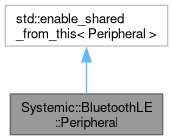Represents a Bluetooth Low Energy (BLE) peripheral. More...
#include <Peripheral.h>

Public Member Functions | |
Constructor and destructor | |
| Peripheral (bluetooth_address_t bluetoothAddress, const std::function< void(ConnectionEvent, ConnectionEventReason)> &onConnectionEvent) | |
| Initializes a new instance of Peripheral with the given Bluetooth address and a callback for notifying of the peripheral connection events. | |
| ~Peripheral () | |
| Disconnects and destroys the Peripheral instance. | |
Connection and disconnection | |
| std::future< BleRequestStatus > | connectAsync (std::vector< winrt::guid > requiredServices=std::vector< winrt::guid >{}, bool maintainConnection=false) |
| Connects to the BLE peripheral. | |
| void | disconnect () |
| Immediately disconnects the peripheral. | |
Getters | |
Always valid. | |
| bluetooth_address_t | address () const |
| Gets the Bluetooth address of the peripheral. | |
| bool | isConnected () const |
| Indicates whether the peripheral is connected. | |
| bool | isReady () const |
| Indicates whether the peripheral is ready. | |
Connected getters | |
Valid only for connected peripherals. | |
| const wchar_t * | deviceId () const |
| Gets the device id assigned by the system for the peripheral. | |
| const wchar_t * | name () const |
| Gets the name of the peripheral. | |
| uint16_t | mtu () const |
| Gets the Maximum Transmission Unit (MTU). | |
Services access | |
Valid only for peripherals in ready state. | |
| std::shared_ptr< Service > | getDiscoveredService (const winrt::guid &uuid) const |
| Gets the Service instance with the given UUID. | |
| void | copyDiscoveredServices (std::vector< std::shared_ptr< Service > > &outServices) const |
| Copy the discovered services to the given std::vector. | |
Detailed Description
Represents a Bluetooth Low Energy (BLE) peripheral.
The most common BLE operations are supported, such as reading the peripheral name, MTU, RSSI, listing services and characteristics.
Once created, a peripheral must be connected before most its methods may be used, and it must be ready before accessing the services. The peripheral becomes ready once all the required services have been discovered.
The connection method connectAsync() is asynchronous and returns a std::future.
A specific Service may be retrieved by its UUID with getDiscoveredService(). A service contains characteristics for which data may be read or written.
The Peripheral class internally stores a WinRT's BluetoothLEDevice and GattSession objects.
Constructor & Destructor Documentation
◆ Peripheral()
| Systemic::BluetoothLE::Peripheral::Peripheral | ( | bluetooth_address_t | bluetoothAddress, |
| const std::function< void(ConnectionEvent, ConnectionEventReason)> & | onConnectionEvent | ||
| ) |
Initializes a new instance of Peripheral with the given Bluetooth address and a callback for notifying of the peripheral connection events.
- Parameters
-
bluetoothAddress The Bluetooth address of the BLE peripheral. onConnectionEvent Called when the connection status of the peripheral changes.
Member Function Documentation
◆ address()
| bluetooth_address_t Systemic::BluetoothLE::Peripheral::address | ( | ) | const |
Gets the Bluetooth address of the peripheral.
- Returns
- The Bluetooth address of the peripheral.
◆ connectAsync()
| std::future< BleRequestStatus > Systemic::BluetoothLE::Peripheral::connectAsync | ( | std::vector< winrt::guid > | requiredServices = std::vector<winrt::guid>{}, |
| bool | maintainConnection = false |
||
| ) |
Connects to the BLE peripheral.
Concurrent calls are invalid and will return an error. This request timeouts after 7 to 8 seconds, as of Windows 10 21H1.
- Parameters
-
requiredServices List of services UUIDs that the peripheral should support, may be empty. maintainConnection Whether to automatically reconnect after an unexpected disconnection (i.e. not requested by a call to disconnect()).
- Returns
- A future with the resulting request status.
◆ copyDiscoveredServices()
| void Systemic::BluetoothLE::Peripheral::copyDiscoveredServices | ( | std::vector< std::shared_ptr< Service > > & | outServices | ) | const |
Copy the discovered services to the given std::vector.
- Parameters
-
outServices The std::vector to which the discovered services are copied (appended).
◆ deviceId()
| const wchar_t * Systemic::BluetoothLE::Peripheral::deviceId | ( | ) | const |
Gets the device id assigned by the system for the peripheral.
- Returns
- The device id assigned by the system.
◆ disconnect()
| void Systemic::BluetoothLE::Peripheral::disconnect | ( | ) |
Immediately disconnects the peripheral.
As a consequence, any on-going request either fails or is canceled, including connection requests.
◆ getDiscoveredService()
| std::shared_ptr< Service > Systemic::BluetoothLE::Peripheral::getDiscoveredService | ( | const winrt::guid & | uuid | ) | const |
◆ isConnected()
| bool Systemic::BluetoothLE::Peripheral::isConnected | ( | ) | const |
Indicates whether the peripheral is connected.
Services may not have been discovered yet.
- Returns
- Whether the peripheral is connected.
◆ isReady()
| bool Systemic::BluetoothLE::Peripheral::isReady | ( | ) | const |
Indicates whether the peripheral is ready.
The peripheral is ready once it has successfully connected and discovered the required services.
- Returns
- Whether the peripheral is ready.
◆ mtu()
| uint16_t Systemic::BluetoothLE::Peripheral::mtu | ( | ) | const |
Gets the Maximum Transmission Unit (MTU).
- Returns
- The MTU, or zero if it doesn't have a valid device.
◆ name()
| const wchar_t * Systemic::BluetoothLE::Peripheral::name | ( | ) | const |
Gets the name of the peripheral.
- Returns
- The name of the peripheral, or null if it doesn't have a valid device.
The documentation for this class was generated from the following files:
- WinRTBle/src/LibWinRTBle/Systemic/BluetoothLE/Peripheral.h
- WinRTBle/src/LibWinRTBle/Peripheral.cpp